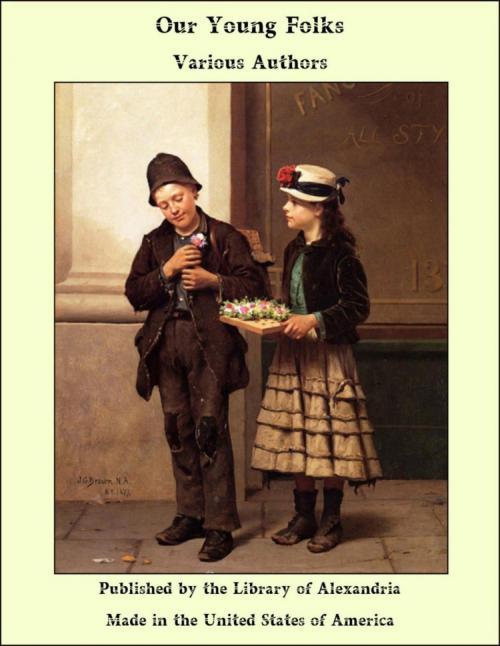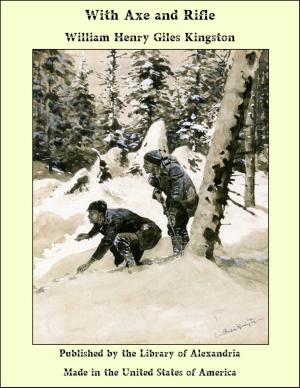| Author: | Various Authors | ISBN: | 9781465592125 |
| Publisher: | Library of Alexandria | Publication: | March 8, 2015 |
| Imprint: | Language: | English |
| Author: | Various Authors |
| ISBN: | 9781465592125 |
| Publisher: | Library of Alexandria |
| Publication: | March 8, 2015 |
| Imprint: | |
| Language: | English |
At Rye Beach, during our summer's vacation, there came, as there always will to seaside visitors, two or three cold, chilly, rainy days,—days when the skies that long had not rained a drop seemed suddenly to bethink themselves of their remissness, and to pour down water, not by drops, but by pailfuls. The chilly wind blew and whistled, the water dashed along the ground, and careered in foamy rills along the roadside, and the bushes bent beneath the constant flood. It was plain that there was to be no sea-bathing on such a day, no walks, no rides; and so, shivering and drawing our blanket-shawls close about us, we sat down to the window to watch the storm outside. The rose-bushes under the window hung dripping under their load of moisture, each spray shedding a constant shower on the spray below it. On one of these lower sprays, under the perpetual drip, what should we see but a poor little humming-bird, drawn up into the tiniest shivering ball, and clinging with a desperate grasp to his uncomfortable perch. A humming-bird we knew him to be at once, though his feathers were so matted and glued down by the rain that he looked not much bigger than a honey-bee, and as different as possible from the smart, pert, airy little character that we had so often seen flirting with the flowers. He was evidently a humming-bird in adversity, and whether he ever would hum again looked to us exceedingly doubtful. Immediately, however, we sent out to have him taken in. When the friendly hand seized him, he gave a little, faint, watery squeak, evidently thinking that his last hour was come, and that grim Death was about to carry him off to the land of dead birds. What a time we had reviving him,—holding the little wet thing in the warm hollow of our hands, and feeling him shiver and palpitate! His eyes were fast closed; his tiny claws, which looked slender as cobwebs, were knotted close to his body, and it was long before one could feel the least motion in them. Finally, to our great joy, we felt a brisk little kick, and then a flutter of wings, and then a determined peck of the beak, which showed that there was some bird left in him yet, and that he meant at any rate to find out where he was.
At Rye Beach, during our summer's vacation, there came, as there always will to seaside visitors, two or three cold, chilly, rainy days,—days when the skies that long had not rained a drop seemed suddenly to bethink themselves of their remissness, and to pour down water, not by drops, but by pailfuls. The chilly wind blew and whistled, the water dashed along the ground, and careered in foamy rills along the roadside, and the bushes bent beneath the constant flood. It was plain that there was to be no sea-bathing on such a day, no walks, no rides; and so, shivering and drawing our blanket-shawls close about us, we sat down to the window to watch the storm outside. The rose-bushes under the window hung dripping under their load of moisture, each spray shedding a constant shower on the spray below it. On one of these lower sprays, under the perpetual drip, what should we see but a poor little humming-bird, drawn up into the tiniest shivering ball, and clinging with a desperate grasp to his uncomfortable perch. A humming-bird we knew him to be at once, though his feathers were so matted and glued down by the rain that he looked not much bigger than a honey-bee, and as different as possible from the smart, pert, airy little character that we had so often seen flirting with the flowers. He was evidently a humming-bird in adversity, and whether he ever would hum again looked to us exceedingly doubtful. Immediately, however, we sent out to have him taken in. When the friendly hand seized him, he gave a little, faint, watery squeak, evidently thinking that his last hour was come, and that grim Death was about to carry him off to the land of dead birds. What a time we had reviving him,—holding the little wet thing in the warm hollow of our hands, and feeling him shiver and palpitate! His eyes were fast closed; his tiny claws, which looked slender as cobwebs, were knotted close to his body, and it was long before one could feel the least motion in them. Finally, to our great joy, we felt a brisk little kick, and then a flutter of wings, and then a determined peck of the beak, which showed that there was some bird left in him yet, and that he meant at any rate to find out where he was.















